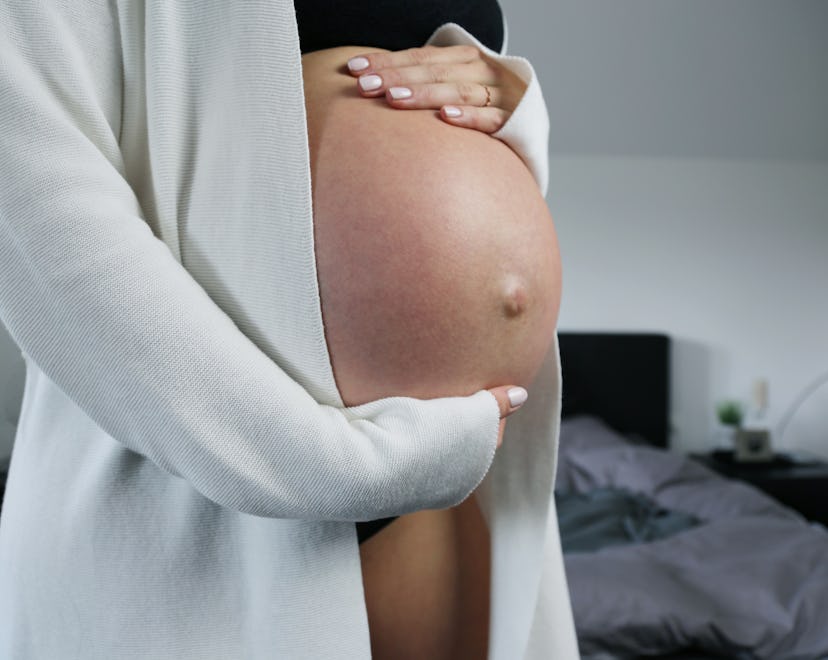Symptoms

Here's What Causes Bellybutton Pain During Pregnancy & What To Do
While it's pretty common, it can be a sign of something more serious.
Aches and pains are just part of pregnancy. That’s why you can expect some swelling, stiffness, and overall ickiness at some point during those nine months. But one pain point that you might not expect can come from the oddest of places: your belly button. That’s right, belly button pain during pregnancy is a real thing, and has some real consequences, too.
Is Belly Button Pain During Pregnancy Common?
In a word, yes. No two pregnancies are alike, and as such, you may or may not experience belly button pain during pregnancy. But at some point, you might notice that you can actually feel your belly button, regardless of whether it’s an innie or an outie. “Belly button pain is quite common in pregnancy and usually benign,” Dr. Cindy M. Duke, MD PhD FACOG, a board-certified OB/GYN, fertility doctor and virologist tells Romper. “For those who experience this type of pain, it doesn’t usually start until the second trimester.”
Here’s Why You’re Having Belly Button Pain During Pregnancy
So basically, once you stop puking during your first trimester, you might start experiencing pain in your umbilicus (that’s the fancy term for belly button) in the second one. But why exactly does this happen? “The belly button has an internal attachment to the top of the bladder,” Dr. Kim Langdon, MD, an OB/GYN, tells Romper. “So when the abdomen grows upward and outward, the tissue can feel stretch.” Basically, the reason why you’re feeling pain is because your uterus is taking up a lot more room and as such, it’s irritating your belly button from the inside. But that’s not the only reason why your umbilicus is unhappy during pregnancy. “The inner part of the belly button can become exposed to the air and become a bit more irritated,” says Dr. Langdon.
Here’s When Button Pain During Pregnancy Might Be Something More Than An Annoying Ache
For the most part, belly button pain during pregnancy is nothing more than a nuisance — until it’s not, that is. “In small instances, belly button pain can be a sign of something more serious such as an umbilical hernia,” Dr. Duke explains. But it could also mean that you’re about to give birth. Yes, belly button pain might mean that it’s not just your umbilicus that’s popping out, but possibly your baby, too. “It’s important to know that some people’s onset of labor may feel like crappy belly button pain,” adds Dr. Duke.
But belly button pain might mean something significant for your pregnancy. While lit can be a sign pf preterm labor, it might also pose a problem for your placenta. “It could be a sign of a separation of the placenta from the uterine wall,” warns Dr. Langdon. So if you’re having an abundance of umbilical pain, you should probably contact your healthcare professional right away so that they can perform an ultrasound to ensure that everything is fine.
Here Are Signs You Should Watch Out For If You’re Having Belly Button Pain
Belly button pain might feel like a pinch or a dull ache. But there are other symptoms that you shouldn’t shrug off in case you’re experiencing them. “If you’re having fever, nausea, vomiting, continuous pain, cramping or bloody stool, they should contact their doctor right away,” advises Dr. Duke. “Likewise, if the area around the belly button becomes tender, hot to the touch or impossible to touch due to pain, they should also call the doctor.”
Here’s How You Can Relieve Belly Button Pain During Pregnancy
Assuming that everything is okay, you can ease the ache by using over-the-counter pain meds that are safe to take during pregnancy, like acetaminophen, advises Dr. Duke. Just be sure to include your practitioner in on your plans. “I strongly recommend contacting your physician if the need for use of any pain medicine becomes necessary,” advises Dr. Duke. “This is especially important to consider after 23 weeks of pregnancy in part so that they can evaluate if you might be in preterm labor or labor.”
Not into pill popping? Not a problem. “You can also use a pregnancy belt to help take some of the strain of the stretching and growing belly off the muscles,” says Dr. Duke. Otherwise, according to Dr. Langdon, “You can expect the pain to go away in a few hours or days.” But if the pain becomes severe (and is accompanied by discharge or bleeding), seek immediate medical attention.
Belly button pain during pregnancy is very common during pregnancy. It might not be the best feeling to feel your umbilicus feeling irritated, but for the most part, it’s perfectly normal. If you experience any additional symptoms, speak to your doctor. You can always rub your belly button (and your bump) to diminish the discomfort — and possibly increase the bonding you have with your baby.
Experts:
Dr. Cindy M. Duke, MD PhD FACOG, a board-certified OB/GYN, fertility doctor and virologist
Dr. Kim Langdon, MD, an OB/GYN
This article was originally published on